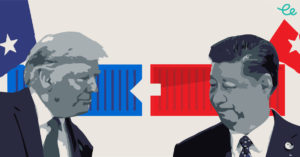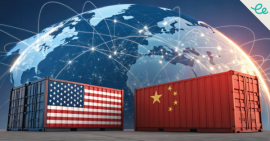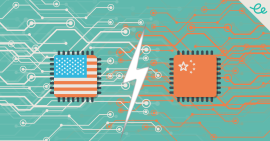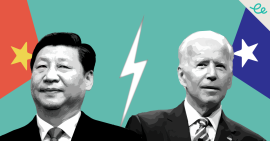The US and China played a little nicer than usual. Trade negotiators met face-to-face, for the first time in nearly two months, to lay the groundwork for high-level talks in early October that optimists hope will deliver an interim trade deal and calm months of turmoil. This article is a summary of major US China news in September 2019.
A deal to end the nearly 15-month trade war could happen “sooner than you think”, claimed President Donald claimed this week. His administration is denying reports that Chinese equities will be blocked or delisted from US exchanges, and limits imposed on US investment in Chinese firms and markets.
Chinese importers will buy US soybeans and pork, China’s Ministry of Commerce confirmed, as the two governments made conciliatory gestures ahead of trade talks early next month, their 13th attempt at resolving the trade war. A 30-strong Chinese delegation met counterparts at the US Trade Representative’s office near the White House.
Chinese agriculture officials planned to make a goodwill visit to American farm regions. Trump said China has started to buy US agricultural products again, which can‘t come too soon as the trade war pushes more American farmers into retirement or bankruptcy.
China’s top diplomat Wang Yi warned of “endless troubles ahead” if the two nations decouple. The U.S. should “avoid picking a misguided fight with the wrong country,” he said. “Decoupling from China’s economy would be to decouple from opportunities, and the future.”
America should retool national security policy, said leaders in Washington, as Beijing is increasingly tapping private Chinese firms to acquire foreign technology for its military.
This “military-civil fusion” drive will upgrade China’s arms industry and build a world-class military capable of challenging the US in Asia and beyond. The Pentagon is compiling a list of Chinese companies with ties to the Chinese military “to help reduce the chances of US weapons supply chains being compromised”.
While Huawei launched another bid to undo a restrictive US law, the Trump administration proposed new rules to exert greater control over foreign investment, a move primarily aimed at preventing China from gaining access to sensitive American technology. Huawei offered to sell its 5G tech to a Western buyer to help create a rival and level the playing field amid widespread distrust, but “few believe that a sale would placate America’s national-security apparatus, at least in the short run.”
Beijing unveiled 16 products to be exempt from upcoming additional tariffs; Trump delayed a tariff hike on Chinese goods from 1 to 15 October, and these goodwill gestures could be backed up by China buying more US farm goods. Mnuchin said they have a “conceptual” agreement on enforcement concerns, ahead of talks in mid-October.
Trump warned he would be “tougher” on Beijing in a second term if the trade talks dragged on – and “China’s Supply Chain will crumble and businesses, jobs and money will be gone!” The latest tariff hike means US shoppers will start to notice price rises for clothes, shoes and other items as more than two-thirds of the consumer goods the US imports from China will now face higher taxes.
It’s costing China too. Several economists have cut their forecasts for GDP growth in 2020 to below 6%. Asian tech leaders warned that trade tensions are accelerating the fragmentation of the global industry.









Comments are closed.